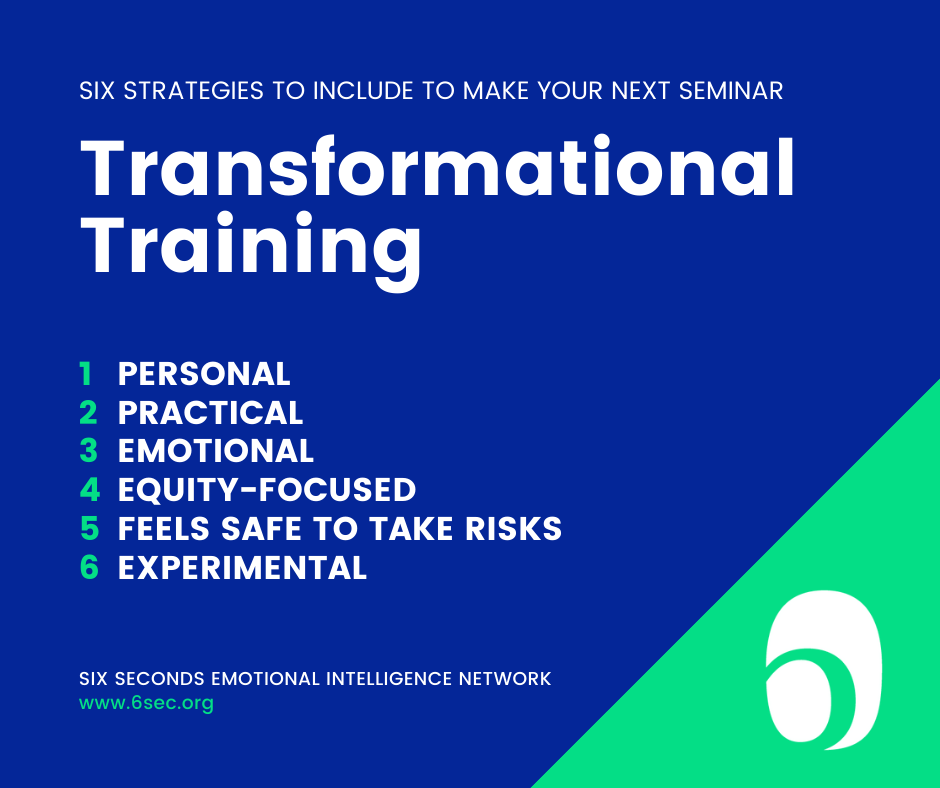Build
Better
Training
6 Brain-based
strategies to
make learning
transformational
What Fuels Transformational Learning?
Let’s take a look at Six Seconds’ principles in action. The Learning Philosophy consists of 6 principles. Here are definitions for each, and examples of how each shows up in Six Seconds’ certifications and general practices.
1. It’s personalized.
There is no such thing as “1 size fits all.”
While people are fundamentally the same, there is also tremendous variety… billions of unique combinations of DNA, life experience, context, personality, style, and more. In that myriad experience, there is not one single “right way” or “right answer”; instead, we each develop ways of being our best selves. Six Seconds calls this principle No Way is The Way.
In practice, this means that Six Seconds’ certifications intentionally teach to many different learning styles, and leave space to effectively work with the complex messiness of real people. And in consulting “the Six Seconds way,” this means that Six Seconds considers the clients’ context and past experience, along with their learning goals and objectives, and selects a curriculum that meets these current needs. In place of prepackaged, quick solutions, Six Seconds values the flexibility and space for people to develop authentic, powerful, individual solutions.
2. It’s practical and action-oriented.
Powerful learning comes to life through action; it’s not only an internal process.
The end goal of learning is positive change and action. If people don’t take action with what they’ve learned, what’s the point? Six Seconds calls this principle 1, 2, 3 PASTA! (It got its name from a toddler’s adorable interpretation of the phrase: 3, 2, 1 BLASTOFF!)
In practice, this means that Six Seconds focuses on supporting the design of specific, effective strategies to put new ideas into action, and on generating the emotions that motivate positive risk-taking. The starkest difference between Six Seconds’ certifications and “typical” training is that instead of spending the majority of time passively listening, we focus on taking action.
3. It’s emotional.
In spite of the conventional wisdom that it’s better to “leave emotions out of it,” people don’t create meaning with emotion or analysis alone; optimal learning integrates thinking and feeling (and action!).
This is supported by a growing body of neuroscience research. Emotions are part of our basic biology. They’re intimately linked to survival, so our brains prioritize emotional messages. Pretending that we can “just be logical” is, in fact, illogical. Instead, when we recognize that emotions are something real and powerful, we can use them carefully to move forward solving problems, making decisions, creating community, and improving performance. Six Seconds calls this principle, Emotions Drive People.
In practice, Six Seconds’ trainers live this principle by creating optimal emotional contexts for learning, and continuously monitoring participants’ level of engagement by noticing their nonverbal communication (If people giving long, boring speeches practiced this principle, we wouldn’t have nearly as many boring talks as we do). It also shows up as a commitment to be appropriately vulnerable in sharing our thoughts and feelings, and building authentic relationships with self, clients, and colleagues. We value the learning and growth that comes from mutual sharing.
4. It’s equity-focused.
Six Seconds believes that each of us is a whole, vibrant, perfectly-imperfect being with profound insight into ourselves and the world.
Everyone has different insights based on their knowledge, experiences and context, and the best solutions for them will come from them. Six Seconds calls this principle Wisdom Lives Within.
In practice, this means Six Seconds’ trainers avoid the temptation toward oversimplifying, giving the easy answer and playing the expert role. Instead, we create opportunities for people to discover their own answers in a reflective, caring, and gently challenging context. Speaking of gently challenging…
5. It’s geared toward brave risk-taking.
Growth requires a stretch beyond the unconscious habits and unexamined beliefs and assumptions that shape our worldview.
While distress undermines learning, some stress is valuable; this means learners and facilitators need to move out of the comfort zone into the stretch zone. Six Seconds calls this principle Fish Don’t Talk About Water. It’s a metaphor: if fish could talk, they wouldn’t bring up water. It’s such a pervasive element of their environment that it simply is. Similarly, humans do not pay attention to what we take for granted, including assumptions, culture, beliefs, habits, patterns and more. To gain new perspectives, learn and grow, we need to challenge these invisible beliefs and embrace positive risk-taking… even if that engenders discomfort.
In practice, this means Six Seconds’ trainers actively work to foster a safe learning environment that encourages and enhances our clients’ risk taking, learning, and growth. It is a key part of learning to move participants out of their comfort zones, as long as it’s done in a respectful, compassionate, and thoughtful manner.
6. It’s experiential.
Learning comes from experiencing and reflecting – doing, thinking, and feeling.
Our brains don’t store information “by itself.” We store information in a context of the experience of that learning; the meaning comes not just from data, but how we interpret that data based on our experience of it. Six Seconds calls this principle The Process is The Content.
In practice, this means Six Seconds is committed to teaching in the way the brain best absorbs and retains information: we activate high-order thinking, ask both abstract and concrete questions, engage multiple learning styles, use metaphors and hands-on experiences, and pace content in brief, varied blocks.

Watch this video from Six Seconds’ EQ Practitioner Certification.
What do you notice? How does this look different from other training you have attended, or what a typical training looks like in your mind?



Are you ready to take your facilitation skills to the next level and activate these strategies into your training? We have a course specifically designed to help trainers implement brain based learning into action. Join us for Facilitator Certification.
